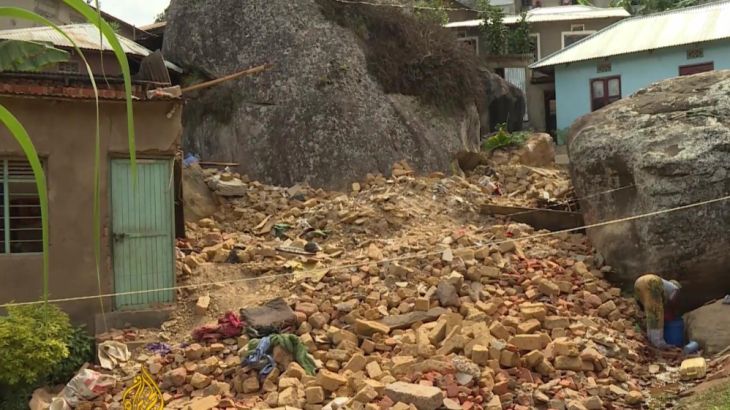Tanzania: Earthquake survivors face task of rebuilding
At least 17 people killed in 5.9 magnitude tremor that injured more than 200 and left hundreds of families homeless.

When the earthquake struck, the brick walls simply crumbled at the orphanage in Tanzania’s far northwestern Kagera region.
Clutching one of the youngest children, Saada Suleiman said she tried to run as Saturday’s tremor made the ground heave beneath her feet.
Keep reading
list of 4 itemsHow Taiwan learned from the past to reduce the risk from earthquakes
How is Afghanistan coping six months after deadly quakes?
‘Violent rumble’: 4.8 magnitude earthquake rattles New York City, northeast
“I felt something, as though someone was pushing me from behind, and suddenly the building was shaking,” said Suleiman, who operates the Uyacho Orphanage Centre in Bukoba township.
“It felt like an electric shock,” she told Al Jazeera, shaking her body and arms to demonstrate the strength of the quake.
People came to help – and Suleiman and the tiny baby were carried to safety.
Though the Uyacho orphanage was reduced to piles of rubble and dangerously half-collapsed walls, none of the children living there was hurt.
More than 2,000 homes and buildings were damaged by the 5.9 magnitude earthquake that hit on Saturday, killing at least 17, injuring more than 200, and leaving hundreds of families homeless.
Prelim M5.7 earthquake Lake Victoria region, Tanzania Sep-10 12:27 UTC, updates https://t.co/k5kypWGl09, 60 #quake tweets/min
— USGS Tweet Earthquake Dispatch (@USGSted) September 10, 2016
Red Cross volunteers are setting up temporary shelters for those forced to sleep in the open, but building materials are in short supply and the demand is high following the earthquake.
“Many families who lost homes or who are afraid to return to damaged ones are staying in open fields and are exposed to the elements and other health risks,” Fatoumata Nafo-Traore, director of the International Federation of Red Cross and Red Crescent Societies regional office for Africa, said in a statement on Wednesday.
“This makes them even more vulnerable,” Nafo-Traore said.
|
|
The earthquake – the first major seismic activity to hit Tanzania in more than a decade – took many by surprise, including Philip Bonventure, the headteacher at Ihungo Church School in Bukoba.
“I didn’t believe it, in fact,” Bonventure said.
“Because I have never met this situation. It was the first time. So it was a very big shock,” he said.
Standing in what was left of the Ihungo church, the Bishop of Bukoba, Method Kilaini, said his thoughts were with those in rural areas who lost their homes but who were not likely to receive the same attention in the aftermath of the earthquake as those in larger towns.
“I have been in the villages. Also there, houses are falling down. Maybe they are not reached by the media … They don’t know where to live,” he said.
Tanzanian Red Cross staff and volunteers are currently assessing the situation in remote areas where the earthquake damaged roads, power supplies and other infrastructure, though heavy rains and difficulty with access to remote areas may hamper relief efforts, the IFRC said.
“It’s a big challenge and we were not prepared for this tragedy,” said Laurent Bangileki, spokesman for the Tanzanian Red Cross.
“This is the first time we’ve had an earthquake. Right now, we are collecting what we can to face this challenge but our resources are limited. We need help from the government,” he said.
Jacinta Sylvester said she was away from home when the quake hit, but she returned just in time to see her house collapse. Now she is relying on the kindness of neighbours.
“I feel bad because I’m having to rely on my neighbours for everything; they are cooking us a little bit of food, giving the children some tea and I can’t do anything in return because I have nothing,” she said.
Severina Gregory’s son was pinned under a wall of bricks when her house collapsed, knocking the young boy unconscious and breaking his leg.
“I am glad my boy is alive. I thank God. That day will stay with me for a long time,” she said.
Now, like many others in Bukoba, Gregory must begin the slow and difficult task of rebuilding her home and her life.